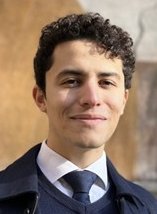
Leena Grover ist seit dem 1. August 2025 ordentliche Professorin und Lehrstuhlinhaberin für Völkerrecht an der Universität St.Gallen mit Schwerpunkt auf dem Recht des internationalen Friedens und der Sicherheit. Zuvor war Leena Grover ausserordentliche Professorin für Völkerrecht an der Tilburg Law School in den Niederlanden (2019-2025).
Ihre Forschung erstreckt sich auf die Bereiche internationales Strafrecht, internationales Recht der Gewaltanwendung, internationale Menschenrechte, Völkerrecht, Verfassungsbildung nach Konflikten und Übergangsjustiz. Sie ist kanadische Juristin (Law Society of Ontario) und hat sich in Rechtswissenschaften habilitiert (Universität Zürich, Interim Constitutions: Legal Nature and Performance, Cambridge University Press, in Vorbereitung), einen Doktortitel in Rechtswissenschaften (Universität Köln, Interpreting Crimes in the Rome Statute of the International Criminal Court (Cambridge University Press, 2014)) und zwei Bachelor-Abschlüsse, einen in Rechtswissenschaften und einen in Internationalen Beziehungen und Politikwissenschaften (LLB, University of Toronto; BA, Western University). Leena ist derzeit Mitglied des wissenschaftlichen Beirats des European Journal of International Law und des Beirats des Global Institute for the Prevention of Aggression.
Leenas Forschung ist empirisch, interdisziplinär und von der Rechtspraxis geprägt. Bevor sie ihre Stelle in Tilburg antrat, verband Leena ihre akademische Arbeit mit mehr als einem Jahrzehnt juristischer Praxis, unter anderem beim Internationalen Strafgerichtshof (IStGH), dem Internationalen Strafgerichtshof für das ehemalige Jugoslawien, dem UN-Menschenrechtsausschuss, dem UN-Hochkommissar für Flüchtlinge, dem Bundesgerichtshof von Kanada, einer internationalen Wirtschaftskanzlei und verschiedenen Organisationen, die pro bono juristische Arbeit leisten. Als Rechtsberaterin der Chefunterhändler für das Verbrechen der Aggression war sie von 2007 bis 2010 an der Ausarbeitung der Definition dieses Verbrechens im Römischen Statut des Internationalen Strafgerichtshofs beteiligt. Ihre Arbeit wurde unter anderem vom Obersten Gerichtshof Kanadas, der Berufungskammer des IStGH und der UN-Völkerrechtskommission zitiert.
Lehrveranstaltungen HS 2025
7,474,1.00 The International Legal Order
7,483,1.00 International Criminal Law
7,495,1.00 Recht/Law: Moot Court International Criminal Court - Part I
Lehrveranstaltungen FS 2026
2,172,1.00 Law I B in the English track: Introduction to Constitutional Law and Public International Law (with Patricia Egli)
Have you ever wondered what it would be like to convincingly argue a case involving the most serious crimes under international law – genocide, other crimes against humanity, war crimes, or the crime of aggression? Then consider representing the University of St. Gallen against more than one hundred teams from around the world at the ICC Moot Court competition in The Hague, the Netherlands in June 2026!
Apply today by sending a short letter of motivation and your CV to Prof. Leena Grover, Chair of Public International Law: leena.grover@unisg.ch. The application deadline is Wednesday, 6 August 2025. Below, you will find answers to the most frequently asked questions and reports from previous mooters about their experiences. I look forward to receiving your application!
Every year, more than one hundred teams from around world participate in the ICC Moot Court competition in The Hague based on a fictitious case. You will argue this case in front of international criminal law experts, including international judges, professors of international law, and other legal professionals. As such, the mooting experience offers participants an authentic simulation of actual ICC proceedings. Members of the St. Gallen team (3-5 students) will variously argue on behalf of the Prosecutor, Defense Counsel, Government Counsel, and Legal Representative of the Victims. St. Gallen’s team will compete against others by submitting written memorials to the judges and orally pleading their case.
Students from the MLaw, MLE, MIA and MIL programmes are permitted to participate in the moot. The entire competition takes place in English. For this reason, applicants should have good English language skills and a basic knowledge of public international law. If you are willing to actively and joyfully work with your fellow St. Gallen team members, you are encouraged to apply irrespective of the grades you have attained. Please consider applying even if you think that you lack sufficient knowledge of international criminal law. During the competition, you will deepen your knowledge. Preparing for the moot will take a lot of time and effort, which is why this course is worth 15 ECTS credits.
Guest students at the University of St. Gallen are expressly encouraged to apply. If you are studying in St. Gallen for only one semester, you will only be able to participate during the fall term. In that case, the examination will consist of writing an essay about one of the legal issues in the ICC Moot Court case.
Participation in the ICC Moot Court is an unforgettable, unique and valuable educational experience. You will greatly improve your writing, presentation, and debating skills in English. You will also acquire deep knowledge of aspects of international criminal law, human rights law, international humanitarian law, general international law, and international relations. You will experience what it is like to work at the world’s first permanent international criminal court, which represents international justice to victims of grave crimes around the world. You will meet distinguished international jurists and practitioners who will provide you with invaluable feedback on your written and oral work. You will meet students from all over the world who care about global justice issues. And you will develop the ability to work intensively with team members, make new friends in St. Gallen and beyond, as well as grow your international professional network. For these reasons, no course taught in a classroom can take the place of participating in the ICC Moot Court.
To apply, please send a short letter of motivation and your CV to Prof. Leena Grover, Chair of International Law (leena.grover@unisg.ch), by Wednesday, 6 August 2025. Interested students cannot enroll for this course in the HSG bidding system. Online interviews with shortlisted applicants will take place within a week or so of this deadline, and course participants selected before the start of the bidding period. Your motivation, willingness to work independently and as part of a team, English language skills, and extent of your international legal education will be assessed during the interview.
Students prepare to write their memorials by familiarizing themselves with general principles of international criminal law, and by studying and discussing important issues of the case as soon as the competition’s organizers publish it.
After intensive research, students independently draft their memorials and improve them until the submission date.
After submitting their memorials, students will start preparing their oral pleadings. Students will learn how to deliver compelling arguments before an international court. Good debating skills, as well as profound knowledge of the applicable law and facts are essential to convincing the judges to accept your arguments. Three members of the moot team will deliver oral pleadings with the support of other team members.
Professorin für Völkerrecht
Office Managerin

Pedro Borges ist Doktorand am Institut für Internationales Recht der KU Leuven. Seine Doktorarbeit befasst sich mit der Auslegung des Völkergewohnheitsrechts zur Staatenverantwortlichkeit und dem Sorgfaltsstandard.
Parallel zu seiner Promotion arbeitet er als wissenschaftlicher Mitarbeiter bei ATHENE – dem deutschen nationalen Forschungszentrum für angewandte Cybersicherheit – an einem universitätsübergreifenden Forschungsprojekt zu künstlicher Intelligenz und Datenrecht (2023–2025). Vor seinem Aufenthalt in St. Gallen war er Gastwissenschaftler an der Universität zu Köln, an deren Akademie für den Schutz der europäischen Menschenrechte und ihrem Institut für Digitalisierung.
Pedro schloss sein LL.M.-Studium in internationalem und europäischem öffentlichem Recht an der KU Leuven mit magna cum laude ab und ist Absolvent der Rechtswissenschaften an der PUC-Rio. Während seines Bachelorstudiums in Rio de Janeiro war er Mitbegründer der PILLS (Public International Law Litigation Society) und nahm am Philip C. Jessup Moot Court und am Nürnberger Moot Court teil. Außerdem war er Austauschstudent an der Universität Edinburgh.
In seiner Freizeit lernt Pedro gerne Fremdsprachen (Französisch, Deutsch, Schweizer Alemannisch und Spanisch).
Veröffentlichungen auf ORCiD: https://orcid.org/0009-0004-0275-3855